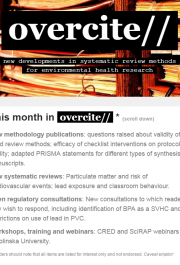We have a new paper out, a contribution to a manuscript led by the Evidence Based Toxicology Collaboration. (This and other recent developments in the field of systematic review for chemical risk assessment are featured in our overcite newsletter, which you can read here.) Full text is open-access and available via the Archives of Toxicology website.










